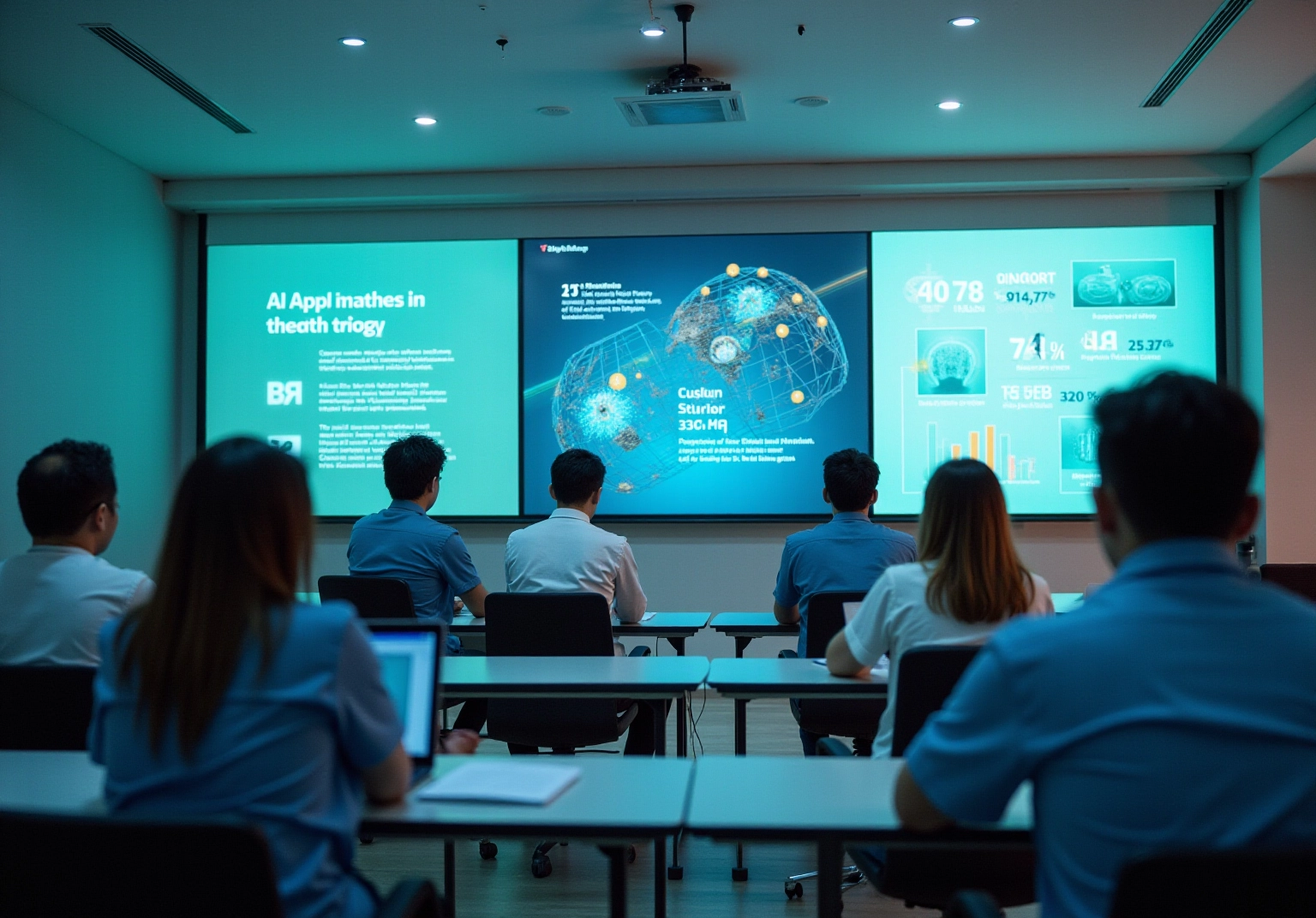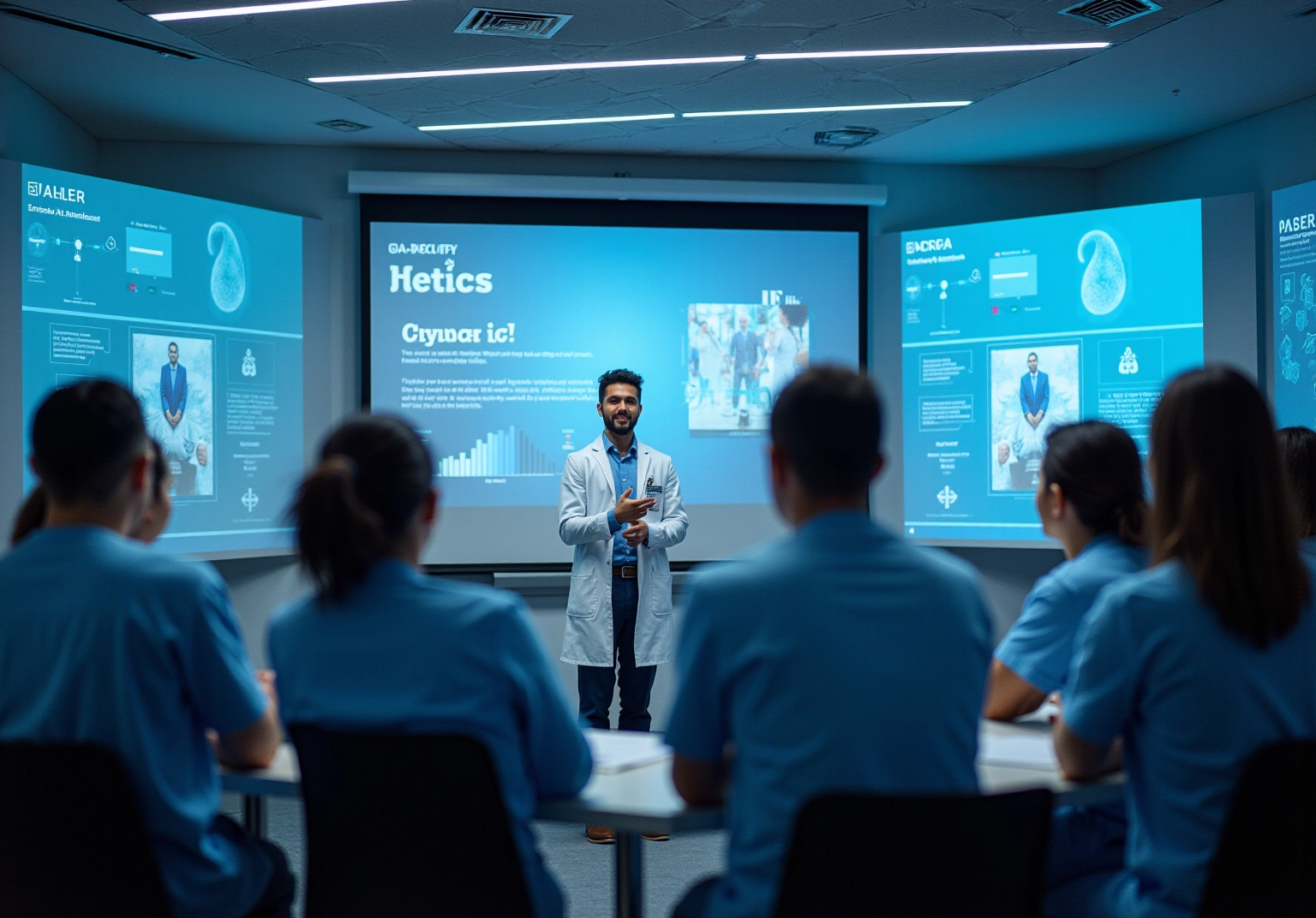
The article’s primary focus is to underscore the critical AI courses in healthcare that are especially advantageous for financial leaders. It asserts that these courses provide executives with essential skills and insights to effectively leverage AI technologies. As a result, organizations can enhance operational efficiency, improve financial outcomes, and ensure compliance.
In the rapidly evolving landscape of healthcare, artificial intelligence (AI) is emerging as a game-changer, particularly for financial leaders navigating complex operational challenges. By embracing AI technologies, executives can unlock significant efficiencies, enhance patient care, and optimize financial outcomes. However, the pressing question remains: which educational pathways equip these leaders with the essential skills to harness AI’s full potential in healthcare? This article explores ten essential AI courses tailored for financial professionals, revealing how they can transform their organizations and prepare for the future of healthcare finance.
The HCC Assistant by Inferscience signifies a transformative leap in healthcare risk adjustment. By automating the collection and analysis of clinical data, it offers real-time coding suggestions through a thorough gap analysis of claims files. This innovative tool not only streamlines the coding process but also enhances billing accuracy by pinpointing overlooked HCC codes, ensuring compliance with Medicare Advantage regulations, and significantly boosting Risk Adjustment Factor (RAF) scores.
Economic leaders can leverage the HCC Assistant to reduce administrative burdens, enabling them to focus on strategic economic planning and ensuring their organizations secure maximum funding from Medicare contracts. Case studies demonstrate that organizations utilizing the HCC Assistant have achieved:
Furthermore, AI-powered coding systems like the HCC Assistant can reduce coding errors by up to 35% and claim denials by 20%. This underscores its critical role in enhancing financial outcomes and improving care for individuals. The HCC Assistant is not just a tool; it is an essential partner in navigating the complexities of healthcare risk adjustment.

MIT xPro offers a comprehensive course on AI in healthcare that focuses on the fundamentals of AI within medical settings, emphasizing its transformative applications in diagnostics, treatment planning, and operational efficiency. Financial executives will discover how AI can enhance resource distribution, streamline workflows, and ultimately improve health outcomes.
For instance, practices that have adopted AI-enhanced prior authorization workflows report a remarkable 45% reduction in clinical review time, allowing medical teams to dedicate more attention to patient care. Furthermore, AI applications have achieved a staggering 91% decrease in document processing time, significantly enhancing operational efficiency.
As the medical landscape evolves, understanding these AI capabilities is crucial for executives aiming to boost financial performance within their organizations. With 39% of medical executives planning to invest in AI for predictive outcomes and clinical decision support in 2023, the potential for improved economic results is substantial. Embracing AI not only addresses current operational challenges but also positions medical organizations for future success.
Coursera’s AI in healthcare courses equip participants with essential skills to harness AI technologies effectively. This curriculum encompasses:
These are all critical for economic leaders. By grasping these concepts, CFOs can make informed strategic decisions that align with financial objectives while ensuring compliance with regulatory standards.
The HCC risk adjustment model is pivotal in forecasting expected expenses for Medicare Advantage beneficiaries, directly influencing the compensation medical organizations receive. As machine learning continues to transform medical finance, individuals armed with this knowledge can:
Furthermore, tools like Inferscience’s HCC Assistant enable CFOs to:
This specialization not only prepares finance leaders to leverage insights gained from AI in healthcare courses for enhanced decision-making but also positions them to drive innovation within their organizations.

The University of Oxford’s program provides healthcare executives with critical strategic insights into the implementation of AI in healthcare courses, particularly in database management. In an era where resource management and compliance are paramount, aligning AI initiatives with organizational objectives is essential. By leveraging advanced data solutions, such as Inferscience’s HCC coding and risk adjustment solutions, executives will discover methods to enhance operational efficiency and improve financial outcomes. This program demonstrates that effective database management not only ensures precise record-keeping and compliance but also optimizes workflows, ultimately leading to improved outcomes for individuals and reducing administrative burdens.

The National University of Singapore offers a comprehensive course on AI in healthcare that explores the practical applications of AI within medical environments, showcasing innovations that significantly enhance patient care and streamline operational processes. Economic executives will discover how these AI applications can substantially reduce costs and improve service delivery, ultimately fortifying the financial stability of their organizations.
For example, AI-driven automation in revenue cycle management has demonstrated the potential to lower expenses and boost efficiency, with hospitals reporting possible annual savings of up to $9.8 billion through AI-powered solutions. Furthermore, organizations utilizing AI for predictive analytics have experienced a remarkable 50% reduction in hospital readmissions, underscoring the tangible benefits of integrating AI into medical operations.
As the medical AI market is projected to surge from $20.9 billion in 2024 to $148.4 billion by 2029, grasping these innovations is crucial for financial leaders aiming to leverage AI for cost savings and enhanced service delivery.

Harvard Medical School’s program presents an expedited learning opportunity that focuses on AI in healthcare courses tailored for medical professionals. This course is meticulously crafted for busy executives who need a rapid comprehension of AI in healthcare courses and its impact on medical services and economic management. Participants will acquire insights into deploying AI solutions that not only enhance operational efficiency but also ensure adherence to evolving regulations.
As AI innovations continue to reshape the medical landscape, understanding their economic implications is crucial for executives aiming to optimize resource allocation and improve outcomes for patients. With the global AI medical market projected to soar to $431.05 billion by 2032, the imperative for financial leaders to adapt and harness these advancements has never been more pressing.

Inferscience’s Care Gaps app exemplifies how AI applications can streamline care by identifying, reviewing, and closing clinical care gaps effectively. Healthcare providers initiate the process by uploading a list of care gaps, which the app automatically examines. This allows providers to review suggested gaps within their EHR systems and select the relevant ones for documentation. Such a systematic method not only improves workflow but also guarantees that individuals receive timely and appropriate care.
For example, a gap in diabetes care may involve a patient who has not undergone an HbA1c test in the past 12 months, despite guidelines recommending this test at least twice a year. Furthermore, integrating this app into existing EHR systems enhances the documentation process and supports financial viability in the medical field by improving the accuracy of HCC coding. Precise coding is crucial for enhancing RAF scores and increasing Medicare reimbursements, which are vital for medical organizations.
As AI and natural language processing (NLP) technologies continue to evolve, their application in AI in healthcare courses plays a pivotal role in transforming medical risk adjustment, ultimately leading to better patient outcomes and enhanced operational efficiency. Financial executives in the medical field must recognize the significance of these tools and consider how they can leverage AI-driven solutions to address reimbursement challenges and improve interoperability within their organizations.

FutureLearn’s course explores the ethical implications of AI in healthcare courses, emphasizing how these considerations influence decision-making and compliance. For financial leaders, understanding the ethical landscape surrounding AI is essential for fostering trust with stakeholders and ensuring adherence to regulatory standards. As AI technologies evolve, understanding their ethical dimensions becomes increasingly critical, especially in AI in healthcare courses where patient care and data security are paramount. This course provides real-world examples that illustrate how ethical decision-making can enhance stakeholder relationships and promote transparency, ultimately leading to improved outcomes in healthcare management, especially when integrated with AI in healthcare courses.
Significantly, the incorporation of tools like Inferscience’s HCC Assistant within electronic health records (EHRs) demonstrates how ethical considerations can directly impact economic outcomes. By accurately identifying overlooked health diagnoses and reducing coding errors that can lead to reimbursement delays and monetary losses for providers, these tools enhance Risk Adjustment Factor (RAF) scores. With 968 students currently enrolled, the course spans eight weeks, requiring a weekly commitment of just two hours, making it accessible for busy professionals.
As Michael Sandel highlights, understanding the ethical consequences of technology is vital for future decision-makers to ensure that AI fulfills human objectives. To apply these insights, financial executives should consider establishing ethical guidelines for AI implementation in their organizations, fostering a culture of transparency and accountability.

The University of Toronto offers a course focused on preparing medical professionals for the emerging challenges associated with AI in healthcare courses. This program focuses on:
Additionally, the course will delve into case studies that highlight the effectiveness of these technologies in transforming medical risk adjustment. Ultimately, this course highlights the transformative potential of AI in healthcare courses by streamlining workflows and minimizing human error in healthcare finance.

DataCamp’s ai in healthcare courses delve into the advantages and challenges associated with AI technologies, particularly in addressing care gaps that significantly influence health outcomes and risk adjustment. Understanding care gaps—instances where individuals do not receive recommended screenings or assessments—is crucial for economic leaders. These gaps frequently stem from resource limitations and restricted access to information, resulting in missed opportunities for early intervention. For example, a diabetic patient may not undergo essential tests, or a post-surgical patient might not have their pain adequately documented, both of which can compromise overall care quality and financial stability.
Furthermore, the course underscores the importance of robust database management within the medical sector. Effective database systems enhance productivity by enabling medical providers to quickly access accurate client information, which is vital for addressing care gaps and improving adherence to medical standards. By harnessing AI in healthcare courses, organizations can automate data management processes, minimize errors, and ultimately elevate the quality of patient services. This balanced perspective is essential for financial leaders as they navigate the complexities of AI integration, ensuring they make informed decisions that align with compliance and financial objectives.

In the evolving landscape of healthcare, the integration of artificial intelligence (AI) is paramount for financial leaders seeking to enhance operational efficiency and improve patient outcomes. The courses highlighted in this article provide invaluable resources for executives aiming to leverage AI technologies effectively. By mastering AI applications, financial leaders can not only navigate the complexities of healthcare finance but also position their organizations for sustainable growth and compliance in a competitive market.
The article outlines various essential AI courses tailored for healthcare finance professionals, including programs from prestigious institutions such as MIT, Harvard, and the University of Oxford. Key insights reveal how AI tools like Inferscience’s HCC Assistant can streamline risk adjustment processes, reduce costs, and improve accuracy in coding, ultimately leading to enhanced financial performance. Additionally, understanding the ethical implications of AI and the importance of database management are crucial for fostering trust and ensuring compliance within organizations.
As the healthcare sector continues to embrace AI innovations, financial leaders must prioritize education and training in this area. By investing in these courses, executives can equip themselves with the knowledge and skills necessary to lead their organizations through the challenges of AI integration, ensuring that they remain at the forefront of healthcare advancements. Embracing AI is not merely a trend; it is an essential strategy for achieving long-term success and delivering better care for patients.